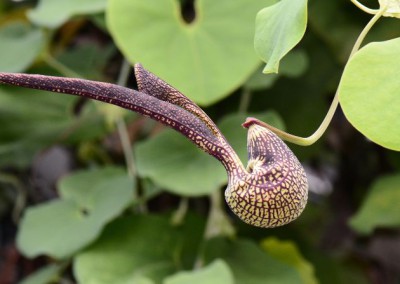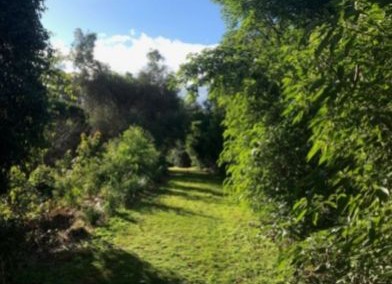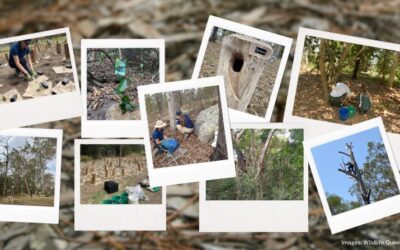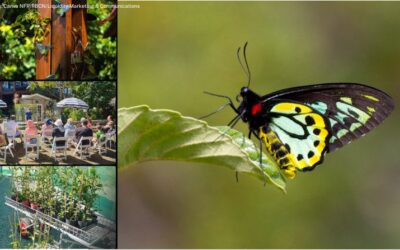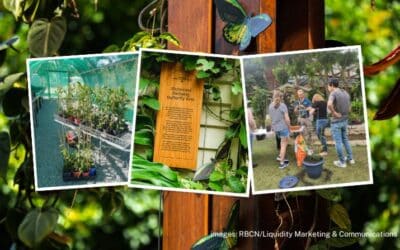Richmond Birdwing Conservation Network
join the rbcn
© Canva NFP
The Richmond Birdwing Conservation Network (RBCN) is an affiliation of individuals, groups and organisations dedicated to the conservation of the Richmond birdwing butterfly (Ornithoptera richmondia) and its host plants, the birdwing butterfly vine (Pararistolochia praevenosa) and mountain aristolochia (P. laheyana).
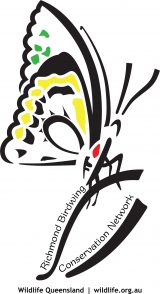
Birdwing Vines Planted each year
Seeds distributed each year to grow vines
Our aims
The Richmond birdwing butterfly, the largest subtropical butterfly in Australia, is closely related to several other birdwings from northern Queensland and New Guinea. It is protected in Queensland, where it is classified as a threatened species at risk of extinction.
Richmond birdwing butterfly populations have declined in Queensland since the 1920s following the loss and fragmentation of their habitats, mainly rainforests. Clearing and burning of understorey vegetation, invasion of riparian native vegetation by weeds, and mining of rainforest valleys for volcanic rocks are ongoing threats.
The RBCN hopes to recover the vulnerable Richmond birdwing butterfly and its essential lowland food plant, the birdwing butterfly vine, across this butterfly’s natural ranges. We aim to do this by:
- rehabilitating habitat corridors between existing fragmented populations and extending these corridors into areas where this beautiful butterfly has disappeared
- working with state and local governments to implement conservation projects, develop programs and support communities in the restoration of habitat
- educating communities and raising awareness of the importance of the birdwing butterfly via workshops on the conservation and biology of the butterfly and the propagation and planting of its food vines
- partnering with numerous landcare and habitat rehabilitation groups to establish key vine planting sites.
Current projects
Ongoing activities
- mapping the current distribution of the butterfly and its food plant
- removing introduced Dutchman’s pipe vines
- supporting scientific research
- running hands-on school projects
- creating flagship corridors by planting vines
- creating educational publications.
Donate your birdwing vine fruit (seed pods) to RBCN’s seed bank
Each year, the RBCN collects thousands of seeds to grow seedlings that revegetate important breeding and feeding habitat for Richmond birdwing butterflies and their larvae. But we need more ripe fruit (pods) so we can continue to cultivate seedlings and carry on with this vital conservation work. Please email birdwing@wildlife.org.au if you have seeds to donate. RBCN will give one potted vine to every person/family that provides ripe pods.
Watch this video to find out more …
Get involved
RBCN educational resources
Fact sheets & guides
Videos & webinars
Richmond birdwing butterfly webinars
Richmond birdwing butterfly videos
- RBCN seedbank (2022). Watch video
- Saving Swallowtails Conference 2021: The Richmond Birdwing, Matt Cecil (Wildlife Queensland). Watch presentation
- Captive-breeding & Release Project, DES (2020). Watch video
- Back from the Bring: Richmond birdwing, Natura Pacific (2019). Watch video
Further reading
Articles & papers:
- Sands, D. (2008), Conserving the Richmond Birdwing Butterfly over two decades: Where to next?. Ecological Management & Restoration, 9: 4-16. https://onlinelibrary.wiley.com/doi/10.1111/j.1442-8903.2008.00382.x
- Sands, D. (2008), Conserving the Richmond Birdwing Butterfly over two decades: Where to next?. Ecological Management & Restoration, 9: 4-16. https://doi.org/10.1111/j.1442-8903.2008.00382.x
- Pyper, W. (2002). Butterfly effect: rethinking butterfly conservation. Wildlife Australia Magazine 39(4): 14-17
Latest RBCN news
Wildlife Queensland projects update: From elusive quolls to butterfly corridors
Wildlife Queensland project officer Hannah Thomas has been busy gathering spotted-tailed quoll data, planting platypus habitat, creating butterfly corridors, and installing greater glider hollows.
Community collaboration continues: Wildlife Queensland and West Village working to safeguard threatened Richmond birdwing butterfly
Wildlife Queensland and the Richmond Birdwing Conservation Network (RBCN) continue to join forces with West Village to enhance the recovery of the threatened Richmond birdwing butterfly (Ornithoptera richmondia).
Wildlife Queensland partners with West Village to help conserve the Richmond birdwing butterfly
Wildlife Queensland and the Richmond Birdwing Conservation Network (RBCN) have teamed up with West Village Brisbane to boost the recovery of the vulnerable Richmond birdwing butterfly.

